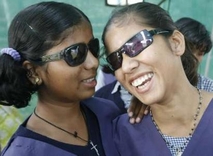|
|
Smiles Are Innate, Not Learned
By Alexander
- December 30, 2008
 From sneers to full-blown smiles, our facial expressions are hardwired into our genes, suggests a new study.
The researchers compared the facial expressions from more than 4,800 photographs of sighted and blind judo athletes at the 2004 Summer Olympics and Paralympic Games.
The analyses showed sighted and blind individuals modified their expressions of emotion in the same way in accordance with the social context. For example, in the Paralympics, the athletes competed in a series of elimination rounds so that the final round of two athletes ended in the winner taking home a gold medal while the loser got a silver medal.
The blind silver medalists who lost their final matches tended to produce "social smiles" during the medal ceremonies. Social smiles use only the mouth muscles. True smiles, known as Duchenne smiles, cause the eyes to twinkle and narrow and the cheeks to rise.
The researchers say sighted athletes who lost their final rounds also showed social smiles. "Losers pushed their lower lip up as if to control the emotion on their face, and many produced social smiles," said researcher David Matsumoto, a psychologist at San Francisco State University.
The athletes also painted anger, sadness and disgust on their faces in a similar fashion. "When a blind and a sighted athlete show sadness the same facial muscles are firing," Matsumoto told LiveScience, adding that sadness is depicted with a downturned mouth and the raising of the inner eyebrows.
One idea on expressions had been that people worldwide learn how to match facial configurations with certain emotional states by watching others.
The new study, which will be published in the January 2009 issue of the Journal of Personality and Social Psychology, suggests that's not the case, since blind individuals would be unable to carry out such observational learning.
"Individuals blind from birth could not have learned to control their emotions in this way through visual learning, so there must be another mechanism," Matsumoto said. "It could be that our emotions, and the systems to regulate them, are vestiges of our evolutionary ancestry. It's possible that in response to negative emotions, humans have developed a system that closes the mouth so that they are prevented from yelling, biting or throwing insults."
Matsumoto was involved in a past study using the same data collection, which revealed blind and sighted athletes show similar gestures of pride (head tilted up and puffed-out chest). Both studies suggest an innate ability to express certain emotions with gestures and facial expressions.
|
|
|
|
|
|  |
|
 From sneers to full-blown smiles, our facial expressions are hardwired into our genes, suggests a new study.
From sneers to full-blown smiles, our facial expressions are hardwired into our genes, suggests a new study.
 We recommend
We recommend



